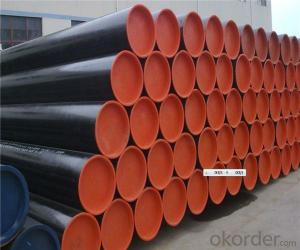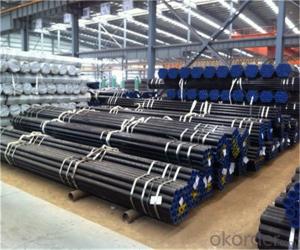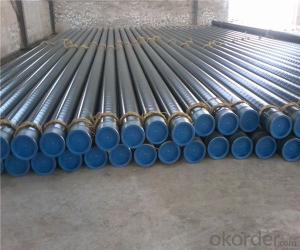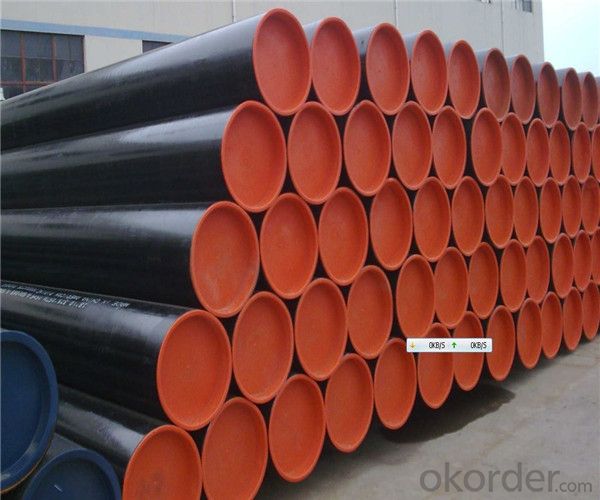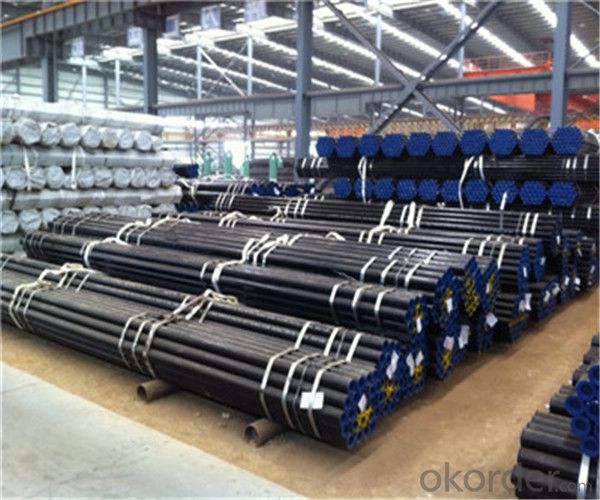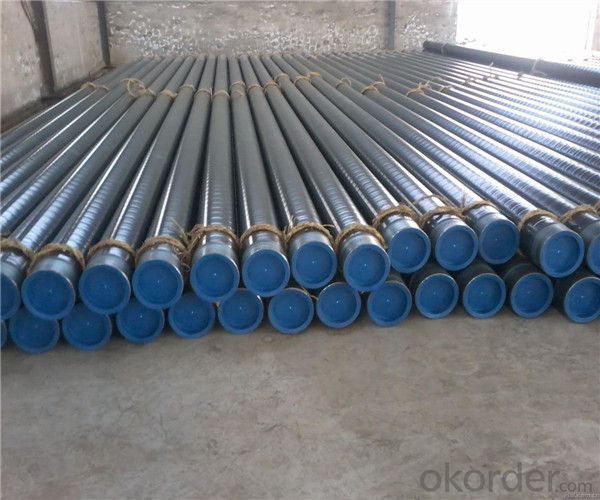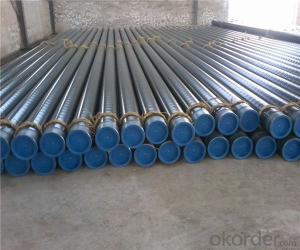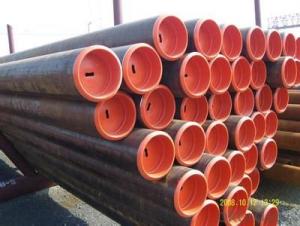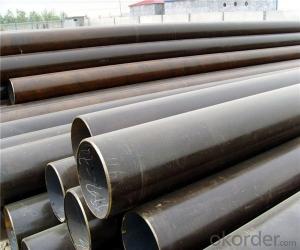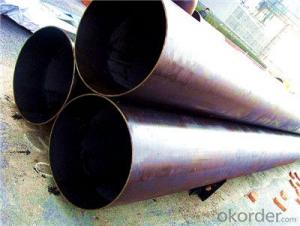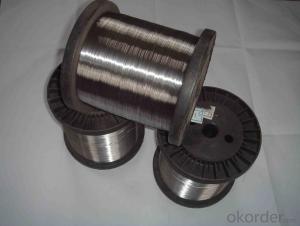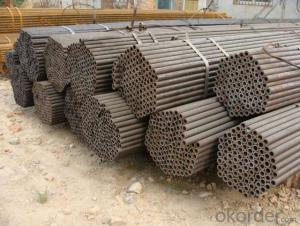Seamless Steel Pipe High Quality and Hot Selling
- Loading Port:
- Tianjin
- Payment Terms:
- TT OR LC
- Min Order Qty:
- 25 m.t.
- Supply Capability:
- 1000000 m.t./month
OKorder Service Pledge
OKorder Financial Service
You Might Also Like
1、Structure of Seamless Steel Pipe High Quality and Hot Selling:
Seamless pipe is formed by drawing a solid billet over a piercing rod to create the hollow shell. As the manufacturing process does not include any welding, seamless pipes are perceived to be stronger and more reliable. Historically seamless pipe was regarded as withstanding pressure better than other types, and was often more easily available than welded pipe.
2、Main Features of Seamless Steel Pipe High Quality and Hot Selling:
• High manufacturing accuracy
• High strength
• Small inertia resistance
• Strong heat dissipation ability
• Good visual effect
• Reasonable price
3、Seamless Steel Pipe High Quality and Hot Selling Specification:
Standard | GB, DIN, ASTM ASTM A106-2006, ASTM A53-2007 |
Grade | 10#-45#, 16Mn 10#, 20#, 45#, 16Mn |
Thickness | 8 - 33 mm |
Section Shape | Round |
Outer Diameter | 133 - 219 mm |
Place of Origin | Shandong, China (Mainland) |
Secondary Or Not | Non-secondary |
Application | Hydraulic Pipe |
Technique | Cold Drawn |
Certification | API |
Surface Treatment | factory state or painted black |
Special Pipe | API Pipe |
Alloy Or Not | Non-alloy |
Length | 5-12M |
Outer Diameter | 21.3-610mm |
Grade | 20#, 45#, Q345, API J55, API K55, API L80, API N80, API P110, A53B |
Standard | ASME, ASTM |
1) Material:20#(ASTM A 106/A53 GRB.API5LGRB,GB),45#,16Mn,10#.
2) Specification range:OD:21.3-610mm,WT:6-70mm,length:6-12m or according to the requirement of clients.
3) Excutive standards:GB,ASME API5L.ASTM A 106/A53,Despite of the above standards,we can also supply seamless steel pipe with standard of DIN,JIS,and so on,and also develop new products according to the requirements of our clients!
4) Surface:black lacquered,varnish coating or galvanized.
5) Ends:Beveled or square cut,plastic capped,painted.
6) Packing:bundles wrapped with strong steel strip,seaworthy packing.
4、Packaging & Delivery
Packaging Details: | seaworthy package,bundles wrapped with strong steel strip |
Delivery Detail: | 15-30days after received 30%TT |
5、FAQ of Seamless Steel Pipe High Quality and Hot Selling:
①How is the quality of your products?
Our products are manufactured strictly according to national and internaional standard, and we take a test
on every pipe before delivered out. If you want see our quality certifications and all kinds of testing report, please just ask us for it.
Guaranteed: If products’ quality don’t accord to discription as we give or the promise before you place order, we promise 100% refund.
②How about price?
Yes, we are factory and be able to give you lowest price below market one, and we have a policy that “ for saving time and absolutely honest business attitude, we quote as lowest as possible for any customer, and discount can be given according to quantity”,if you like bargain and factory price is not low enough as you think, just don’t waste your time.Please trust the quotation we would give you, it is professional one.
③Why should you chose us?
Chose happens because of quality, then price, We can give you both.Additionally, we can also offer professional products inquiry, products knowledge train(for agents), smooth goods delivery, exellent customer solution proposals.Our service formula: good quality+good price+good service=customer’s trust
SGS test is available, customer inspection before shipping is welcome, third party inspection is no problem.
6、Seamless Steel Pipe High Quality and Hot Selling Images:
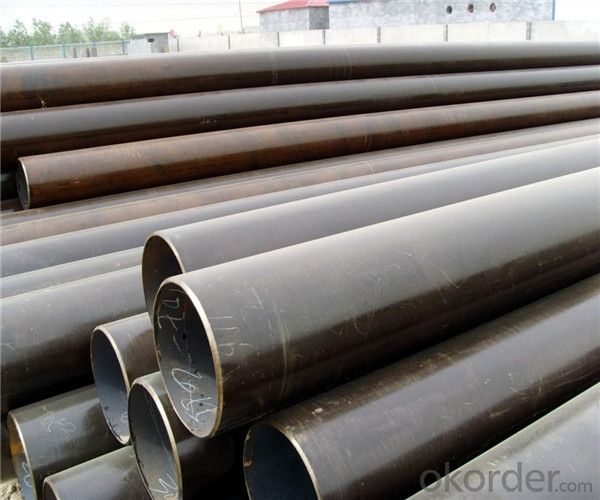
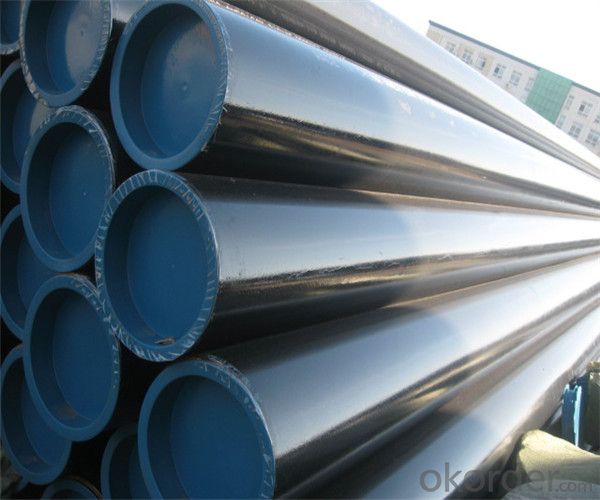
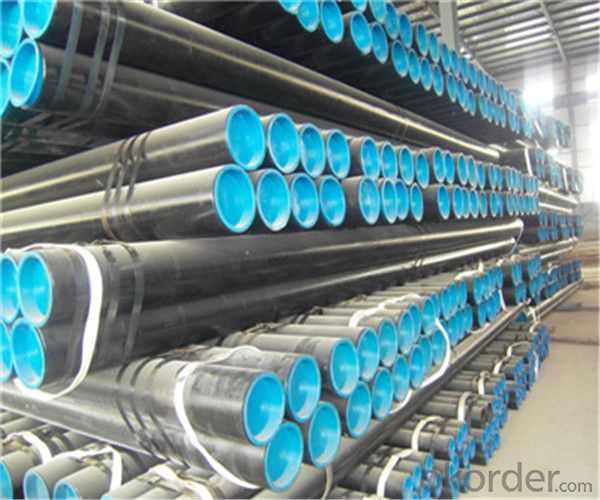
- Q: What are the advantages of using pre-fabricated steel pipes?
- There are several advantages of using pre-fabricated steel pipes. Firstly, they offer superior strength and durability, making them resistant to extreme weather conditions and corrosion, resulting in longer lifespan. Secondly, pre-fabricated steel pipes can be manufactured to precise specifications, ensuring easy installation and reducing construction time and costs. Additionally, they provide excellent structural integrity, which makes them ideal for carrying heavy loads and withstanding high pressure. Lastly, pre-fabricated steel pipes are eco-friendly as they are recyclable, contributing to sustainability and reducing environmental impact.
- Q: What are the different methods of pressure testing steel pipes?
- There are several different methods of pressure testing steel pipes, including hydrostatic testing, pneumatic testing, and ultrasonic testing. Hydrostatic testing involves filling the pipe with water and pressurizing it to a specified level to check for leaks or weaknesses. Pneumatic testing is similar but uses compressed air or gas instead of water. Ultrasonic testing involves using high-frequency sound waves to detect any defects or flaws in the pipe. Each method has its own advantages and is chosen based on the specific requirements and industry standards.
- Q: Can steel pipes be used for steam applications?
- Yes, steel pipes can be used for steam applications. Steel pipes have high strength and durability, making them suitable for carrying high-pressure steam. They can withstand the high temperatures and pressures associated with steam, making them a reliable choice for steam transportation in various industries.
- Q: How are steel pipes used in the oil and gas industry?
- Steel pipes are widely used in the oil and gas industry for various purposes. They are primarily used for transporting and distributing oil and gas from extraction sites to refineries and end consumers. Steel pipes are also used in drilling operations, where they are utilized as casing and tubing to extract oil and gas from wells. Additionally, steel pipes are employed in the construction of storage tanks, pipelines, and other infrastructure required for the production, processing, and transportation of oil and gas. Overall, steel pipes play a crucial role in ensuring the efficient and safe operation of the oil and gas industry.
- Q: Seamless steel tube 89X4 meters, how heavy?
- According to the theory, each meter is 8.3844 kilograms. If you want to be precise, you'll lose your own weight.
- Q: Can steel pipes be used for underground geothermal systems?
- Indeed, underground geothermal systems can utilize steel pipes. Given their robustness and longevity, steel pipes are frequently employed in geothermal systems. They can endure the elevated temperatures and pressures inherent in the extraction and distribution of geothermal energy. Moreover, steel pipes exhibit excellent resistance to corrosion, a crucial attribute when contending with the subterranean milieu and the diverse array of minerals and chemicals present in the soil. Furthermore, steel pipes possess versatility, enabling straightforward underground installation and connection, rendering them a fitting selection for geothermal systems.
- Q: What are the applications of steel pipes in the automotive industry?
- Steel pipes are used in the automotive industry for a variety of applications, including exhaust systems, fuel lines, and structural components. They provide durability, corrosion resistance, and high strength, making them ideal for withstanding the harsh conditions and heavy loads experienced in automotive applications. Steel pipes also offer flexibility in design and can be tailored to meet specific requirements, ensuring efficient and reliable performance in vehicles.
- Q: Why should the weak electricity be pre buried with galvanized steel pipe?
- Galvanized steel is widely used in construction, machinery, coal, chemical industry, railway vehicles, automobile industry, highway, bridge, container, sports facilities, agricultural machinery, petroleum machinery, prospecting machinery and other manufacturing industries.
- Q: How are steel pipes used in bridge construction?
- Steel pipes are commonly used in bridge construction as structural elements to provide support and stability. They are often used as piers, piles, or columns to bear the weight of the bridge and transfer it to the ground. Steel pipes are also utilized in the construction of bridge decks and railings. Their strength, durability, and versatility make them essential components in bridge engineering.
- Q: What is the difference between steel pipes and polyethylene pipes?
- Steel pipes are made of a strong and durable material, steel, which makes them suitable for high-pressure and high-temperature applications. They are also resistant to corrosion, making them ideal for transporting liquids and gases. On the other hand, polyethylene pipes are made of a flexible plastic material, which makes them easier to install and handle. They are lightweight, resistant to chemicals, and have a low risk of corrosion. However, they may not be suitable for very high-pressure or high-temperature applications.
Send your message to us
Seamless Steel Pipe High Quality and Hot Selling
- Loading Port:
- Tianjin
- Payment Terms:
- TT OR LC
- Min Order Qty:
- 25 m.t.
- Supply Capability:
- 1000000 m.t./month
OKorder Service Pledge
OKorder Financial Service
Similar products
Hot products
Hot Searches
Related keywords
